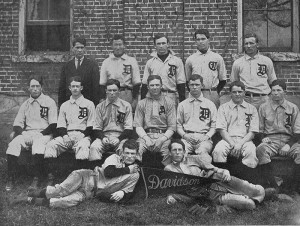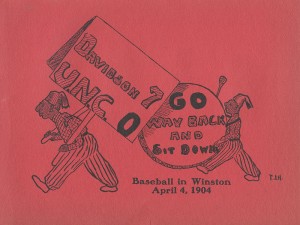Even though classes are winding up, it’s still baseball season on campus.
Baseball goes back into the 1870s at Davidson, we know that Tommy (Woodrow) Wilson played while he was here. Until 1902 baseball games were played between classes or against local teams. Intercollegiate games started in 1902 and Davidson soon produced a few players who went on to play professionally.
Two of them played in the April 4, 1904 game against Chapel Hill. One was Robert “Doc” Vail, class of 1905. Vail only attended Davidson for one year and his professional career was even briefer. He spent 3 years with a Lynn, Massachusetts minor league them and then pitched four games for the Pittsburgh Pirates in 1908.
William Fetzer, class of 1906, spent two years at Davidson as a student and later returned to spend 5 years as a coach. A 1906 article in the Charlotte Observer provides a glimpse of his early career: ‘Billy’ Fetzer, the Concord baseball player who is doing things with the Danville team in the Virginia State League this season, won a big bunch of applause here this afternoon in the game with Roanoke, when he batted the longest hit ever seen on the local grounds and one of the longest hits ever made in the South. The drive was more than 700 feet from the home plate were it hit a church steeple was was thus stopped in its flight which no doubt would have gone over 1,100 feet. The grand stand yelled for fully five minutes and the play had to be stopped by the umpire until the fans and players on both teams regained their equilibrium. Fetzer spent a season with the Philadelphia Athletics.
 Everett Sherrill, class of 1908, attended all four years and graduated from Davidson. His senior yearbook entry describes him as “Knows more about base ball than Spalding’s guide. What he doesn’t know about the game is not worth finding out. The popular captain of the ’08 nine. A good student and an all-round athlete. He counts none among his enemies.” Known as “Dusty,” Sherrill combined careers in dentistry and baseball, playing on league teams during college vacations and on major league teams for 7 years.
Everett Sherrill, class of 1908, attended all four years and graduated from Davidson. His senior yearbook entry describes him as “Knows more about base ball than Spalding’s guide. What he doesn’t know about the game is not worth finding out. The popular captain of the ’08 nine. A good student and an all-round athlete. He counts none among his enemies.” Known as “Dusty,” Sherrill combined careers in dentistry and baseball, playing on league teams during college vacations and on major league teams for 7 years.
One of Sherrill’s teammates, Fred Anderson, class of 1909, also studied dentistry and played professional ball. Anderson played for the, Boston Red Sox, AL (1909, ’13), Buffalo Blues, Federal (1914-15), and the New York Giants, NL (1916-18). A newspaper clipping in Anderson’s alumni file records that he was “with the New York Giants in 1916 when they established two world’s records. One of these records was the winning of sixteen games away from home, five of the games being pitched by Dr. Anderson. The second record was that twenty-six consecutive games were won at the Polo Grounds in New York, three of these being pitched by Dr. Anderson. “ He also pitched in the 1917 world series.
Everett Booe, class of 1911, played for the Pittsburgh Pirates, NL (1913), Indianapolis Hoosiers, Federal (1914) and Buffalo Blues, Federal (1914) before going on to play the minor leagues for 17 years. Thanks to Presbyterian College Archivist Nancy Griffith for sharing this story:
One of the most notable things about Booe, however, proved to be his name. The “e” is silent, so the name is pronounced “boo.” Before the advent of broadcasting systems and names on the uniforms, umpires introduced the players as they were put into the game. Booe’s name caused no end of confusion on the part of umpires, and amusement on the part of the fans. William Hageman quotes Pirates icon Honus Wagner on a situation that occurred in 1913: “When I was playing with the Pirates, we had a rookie, Everett Booe. One day, we were giving home plate umpire Bill Klem a hard time, and his temper was short. Fred Clarke sent Booe up to pinch hit, and Klem asked him his name. He said, ‘Booe.’ Klem said, ‘What did you say?’ And the rookie replied, ‘Booe.’ Well, Klem got infuriated and was going to throw Booe out of the game until Clarke came out and showed him the scorecard and told him that the kid’s name really was Booe.


Speak Your Mind